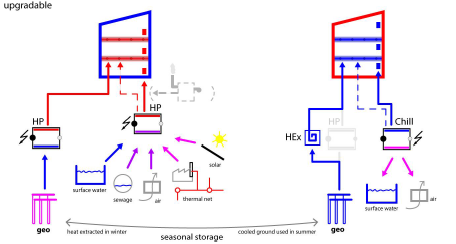Secure, clean and efficient Energy - MPC-: GT
H2020-EE
The aim of the MPC-: GT project is to overcome current market barriers for buildings with thermally activated building components and ground source heat pumps by developing a design strategy and a set product specification that reduce engineering and commissioning costs to levels comparable to those of rivalling, less efficient HVAC technologies.

The innovative concepts aim at increasing the share of low valued (low-grade) energy sources by means of using low energy systems on the one hand and aim at upgrading low/moderate temperature resources on the other hand.
The overall solution consists of an optimal integration of GEOTABS and secondary supply and emission systems.
To allow for an optimal use of both the GEOTABS and the secondary system, a split will be made between a so-called “base load” that will be provided by the GEOTABS and the remaining energy needs that should be supplied by the secondary system. A generic rule, eliminating case-by-case simulation work, will be developed.
The second part of the proposed solution aims at a white box approach for Model Predictive Control (MPC) to generate a controller model with precomputed model inputs such as disturbances and HVAC thermal power to avoid case by case development. Research is needed to assess the overall performance and robustness of such an approach towards uncertainties.
As such, the MPC-: GT consortium believes to have identified an integrated solution that will provide a near optimal design strategy for the MPC GEOTABS concept using optimal control integrated design. The solution will support the industry, especially the SME members, to expand their activities and strengthen their competitiveness.
Objectives
These are the objectives of MPC-: GT:
- A hybrid MPC GEOTABS system, a new heating and cooling solution combining a low grade source of thermal energy (geothermal source), a dedicated heat pump, model-based predictive control, thermally activated building system (TABS) and supported by a new holistic building design procedure will be developed, with the overall efficiency for heating and cooling improved by 25 % as compared to the current best practice GEOTABS case..
- A method of choosing the appropriate, specific components for the hybrid MPC GEOTABS solutions, such as bore holes, heat pumps, TABS, control systems and secondary supply and emission systems, in order to achieve optimal performance of the integrated system – goals include zero GHG emissions, Energy Plus buildings, and maximum grid flexibility for demand response -,will be developed.
- A control system suitable for the hybrid MPC GEOTABS solution, with the Model-based Predictive Controller (MPC) as the high-level controller and state-of-the-art low-level controllers, will be developed.
- The resulting automated MPC toolchain will be an open solution suitable for any control system that supports open communication protocols. The controller will be Smart Grid ready.
- The groundwork for the establishment of a trade body (association) to promote the concept and help to establish the best practices according to the project will be laid down.
- A detailed business plan, tailored for every consortium member, will be developed to help promote the product and maximize the project impact. Three technology transfer policies will be proposed – licensing, franchising and certification of the product.
- The hybrid MPC GEOTABS approach will be validated on a virtual validation test-bed and on at least 3 real, high-visibility buildings as well.
Role of Ghent University
Ghent University is the co-ordinator of the project and spearheads the base load assessment and building modeling efforts within the project
Contact
Prof. Jelle Laverge
Department of Architecture and Urban Planning
Phone number: +32 9 264 37 49
E-mail: jelle.laverge@ugent.be